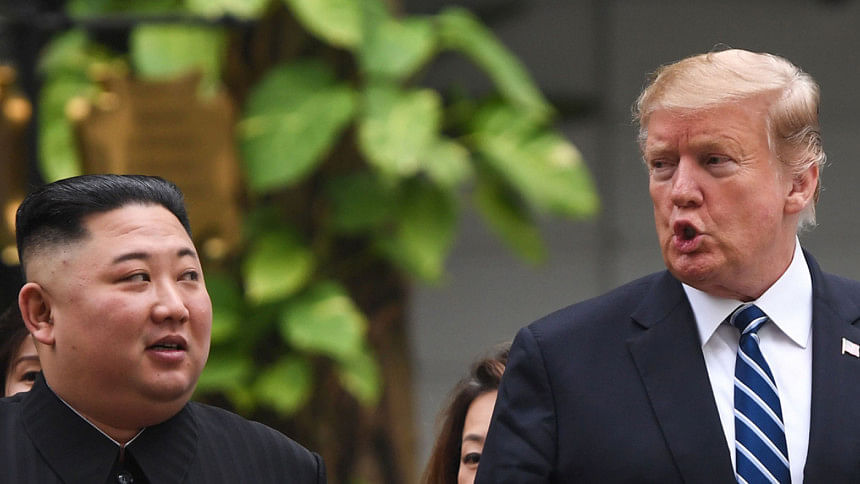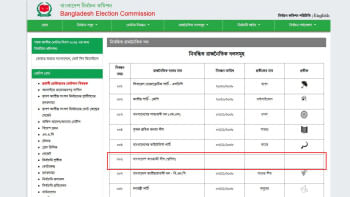NKorea's Kim says ready to denuclearise

North Korean leader Kim Jong Un said on Thursday he was willing to give up his nuclear weapons and he would not be holding a second summit with US President Donald Trump in Vietnam if he were not.
Kim and Trump began a second day of talks earlier on Thursday in the Vietnamese capital, Hanoi, with both expressing hope for progress on improving relations and the key issue of denuclearisation.
"If I'm not willing to do that, I won't be here right now," Kim told reporters through an interpreter, when asked if he was ready to give up his nuclear weapons.
Trump, responding to that, said: "That might be the best answer you've ever heard."
The two leaders were sitting across from each other at a conference table, with their aides.
Kim did not elaborate on what "denuclearisation" would entail, but asked if he was ready to take concrete steps, Kim said they had just been talking about that.
"Hope you give us more time to talk. Even a minute is precious," he told reporters.
While the United States is demanding North Korea give up all of its nuclear and missile programmes, the North wants to see the removal of a US nuclear umbrella for its Asian allies such as South Korea and Japan.
NO RUSH
The two leaders' summit in Singapore in June, the first between a sitting US president and a North Korean leader, produced a vague statement in which Kim pledged to work toward denuclearisation of the Korean peninsula.
But there has been little progress since.
Kicking off the second day of talks at the French-colonial-era Metropole hotel earlier, Trump again stressed the talks aimed at tackling North Korea's nuclear threat should not be rushed.
"I've been saying very much from the beginning that speed is not that important to me. I very much appreciate no testing of nuclear rockets, missiles, any of it, very much appreciate it," Trump told reporters before his session with Kim.
"Chairman Kim and myself, we want to do the right deal."
North Korea has conducted no nuclear or intercontinental ballistic missile tests since late 2017.
Kim, asked by a reporter if he was confident about a deal, said, through an interpreter:
"It's too early to tell, but I wouldn't say I'm pessimistic. For what I feel right now, I do have a feeling that good results will come out," he said, in what was believed to be his first ever response to a foreign journalist.
"There must be people who watch us having a wonderful time, like a scene from a fantasy movie. We have so far made lots of efforts, and it's time to show them," Kim said.
Trump reiterated North Korea's potential, if a deal can be done, saying the isolated country could be an "economic powerhouse".
Asked if they were discussing human rights, Trump said they were discussing everything.
The two leaders took a brief break from their talks after about half an hour to stroll in the leafy hotel courtyard, by a swimming pool.
Trump and Kim have a series of meetings scheduled at the Metropole and will later hold a "joint agreement signing ceremony", the White House said.
After, Trump plans a news conference at 3:50 pm (0850 GMT).
PRESSURE
The White House has given no indication of what the signing ceremony might involve, although the two sides' discussions have included the possibility of a political statement to declare the 1950-53 Korean War over.
They have also discussed partial denuclearisation measures, such as allowing inspectors to observe the dismantling of North Korea's Yongbyon nuclear reactor, US and South Korean officials say.
US concessions to North Korea could include opening liaison offices or clearing the way for inter-Korean projects, but critics say Trump risks squandering vital leverage if he gives away too much, too quickly.
Kim said he would welcome the US opening a liaison office in Pyongyang, while Trump said: "Not a bad idea."
US intelligence officials have said there is no sign North Korea will give up its entire arsenal of nuclear weapons, which Kim's ruling family sees as vital to its survival, and analysts say Pyongyang is unlikely to commit to significant steps without an easing of punishing US-led sanctions.
Facing mounting pressure at home over investigations into Russian meddling in the election, Trump has sought a big win by trying to persuade North Korea to give up its nuclear weapons in exchange for promises of peace and development, a foreign policy goal that has confounded multiple predecessors.
In the United States on Wednesday, his former personal lawyer Michael Cohen testified at a congressional hearing in Washington, calling Trump a "conman" who knew in advance about the release of stolen emails aimed at hurting his Democratic rival in the 2016 election campaign.

 For all latest news, follow The Daily Star's Google News channel.
For all latest news, follow The Daily Star's Google News channel. 



Comments